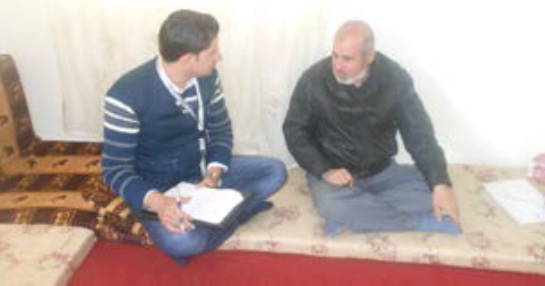The Syrian crisis has caused the largest refugee wave of modern times. According to the United Nations High Commissioner for Refugees (UNHCR), Syrian refugees will soon surpass Afghan refugees to become the largest refugee population in the world. Many have found refuge in places like Jordan.
In recent months, between 400 and 1000 Syrians have arrived in Jordan every day. 611 thousand refugees have been registered by UNHCR and according to A. Harper, the representative of UNHCR in Jordan, another 200 thousand Syrians will cross the border this year. Now, almost 80 % of Syrian refugees live outside of refugee camps. Speaking on the subject, A. Harper has suggested that the international community does not participate enough in building institutions which would enable Jordan to reduce the impact of the refugee crisis (e.g. hospitals or schools). According to A. Harper, if the world expects Jordan to “leave its door open”, they should help them.
Refugee camps in Jordan currently accommodate about 125 thousand people. In April, the third institution of this type opened in order to relieve the pressure placed upon the host country and on the biggest Jordanian camp Zaatari. The camp Azraq, situated about a hundred kilometres to the east of Amman, should take up to 130 thousand people in an area of 15 square kilometres. The international community has invested 45 million Jordanian dinars (JOD; approx. 360 million CZK), which covers the cost of building roads, infrastructure, shelters, hospitals, water systems, schools and police stations.
The inter-parliamentary delegation visited the camp of Zaatari in order to judge and report on the situation there. The report primarily concerns the poor hygienic situation which can lead to the spreading of different diseases among the refugees. It also notes the insufficient control over purchased and sold food. According to the report, the food is stored in poor conditions and refugees are not sufficiently informed about its origin. Despite this, the delegation appreciated the availability of a wide range of goods, such as home supplies, accessories and clothes.
A survey made by the British organisation Oxfam, implemented in three Jordan areas (Zarqa, Balqa, the valley of Jordan and Jawa) shows that more than 65 % of refugees are afraid that they will not be able to come back to Syria. For many, the possibility of coming back soon is increasingly falling out of sight.
Protection of Children
Due to the continuing crisis, the future of an entire generation of Syrian children is now under threat. The data available to the United Nations Children’s Fund (UNICEF) shows that children make up 53% of the Syrian refugees registered in Jordan. Furthermore, according to UNHCR, during the year 2013 more than 10 thousand Syrian children were born in Jordan.
In light of this, UNICEF works on mediating safe education, enhancing protection against abuse and violence and providing psychological aid to children. Special attention is paid to contact with the most vulnerable children, minors without adult accompaniment, children who are not attending school, working children, the handicapped and those in danger of premature marriages.
Caritas Jordan
Since the beginning of the crisis, Caritas Jordan has also provided help to Syrian refugees through its work in the areas of Amman, Irbid, Mafraq, Zarqa, Karak, Balqa, Madaba, Ramtha, Ajloun, Aqaba and Salt. Caritas Jordan take care of approximately 34,000 households and 27,500 persons, i.e. about 200,000 Syrian refugees in total. This includes the provision of help in areas such as medical care, education (mainly of children), material aid (hygienic supplies, household equipment, clothes, shoes, blankets, etc.), housing allowance, food and counselling.
A Newly Returned Hope
Riad Jaber Al-Nawawi flew to Jordan in February 2012 with his wife Salima and their daughters – Wisam (29), Salam (14) and Alaa´ (13). “I have three daughters, after the conflict escalated and the violence spread, we did not feel safe even in our own home. I was worried about my daughters, so I finally decided to leave,” Riad said.
Fortunately, Riad managed to find a three-room house for 200 JOD (about 5,600 CZK) in Al-Husn, in the north of Jordan. In order to pay the monthly rent and water supply bills, Riad was forced to spend his family’s savings and sell his wife’s jewellery.
Jordan. In order to pay the monthly rent and water supply bills, Riad was forced to spend his family’s savings and sell his wife’s jewellery.
Riad’s brother, who lives in the area of Mafraq, recommended Riad to visit the Caritas Centre in Al-Husn. “The people in the Centre treated me with great respect and love. It has been a long time since I experienced this feeling,” Riad explains.
Caritas supplied Riad with cheques for home and hygiene supplies, blankets and a heating element. “I was desperate and I had nothing but visiting Caritas Centre gave me hope and the feeling that I am a human being who deserves life. … This feeling of dignity was even more important to me than the material aid I received,” Riad concludes.
The information and the story of Riad Jaber Al-Nawawi was taken from a Situation Report made by Caritas Jordan. The collection Caritas for Syria is still open to all contributions, for which we wholeheartedly thank you.







